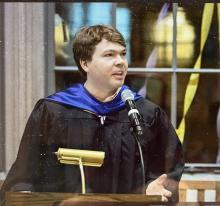By Kyle Sledge
It was fall 2017; the leaves were changing colors, and I couldn’t shake the nagging feeling of unfinished business. A few months prior, I successfully passed the third and final exam of the Chartered Financial Analyst professional designation, after multiple years of intense self-study. Earning the right to use the CFA credential was a significant career milestone that paired well with my on-the-job training as a bank examiner with a regulatory agency. With this achievement in the rearview-mirror (and significantly more free-time at my disposal), I sensed a lingering itch that my self-development journey was incomplete.
Reflecting on my experiences as a financial risk professional, I recognized a significant skill-gap. The financial services industry was abuzz with excitement surrounding the transformative potential of open-source programming and data science. These skills were increasingly in-demand by my current employer and the broader financial industry, but not well-covered in industry-leading professional certifications like the CFA. I initially learned about the University of Washington’s CFRM program as an academic affiliate of the Global Association of Risk Professionals (Academic Partner Provider List | GARP), and was intrigued by financial engineering coursework that would not force me to “press pause” on my career. Before long, I saw CFRM coursework as a bridge that would help me acquire increasingly in-demand skills at the intersection of data science and financial services.
My journey with UW began incrementally, starting with a CFRM certificate in fall 2018. The certificate was initially attractive as an opportunity to dip my toes into the water, before fully committing to the master’s degree. Immediately, I was impressed by the rigor of CFRM course content, high-quality instructors with industry experience, aptitude of my peers, and motivating connections between course material and industry-relevant problems. UW’s technology investments and multiple channels for connecting with CFRM professors demonstrated an early commitment to the user-experience for online students, even before the global pandemic made these practices fashionable. Last but not least, the flexibility to attend classes anywhere along the continuum between part-time/online and full-time/in-person (without making concessions on the quality of instruction) was a significant differentiator from competing financial engineering and MBA programs. Altogether, the UW CFRM presented a compelling package, which made it an easy decision for me to continue onto the Master’s program as part of the fall 2020 cohort.
As I progressed in my CFRM studies and cultivated new skills, my co-workers and managers took notice, which opened new-doors within the workplace. In early 2022, I jumped at an opportunity to transition internally onto a newly-created data science team that works hip-to-hip with my previous team of trading & counterparty credit specialist regulators. The work is highly-dynamic, mission-driven, and it’s extremely rewarding to attack familiar challenges with new skills cultivated through CFRM coursework. Because of the treasure-trove of data assets available to the official sector, it’s a wonderful place to be curious. Bringing these new skills to bear within this environment feels analogous to a hidden TV camera, lurking underneath a high-stakes poker table, which affords a unique perspective on financial markets that is not fully-visible to individual participants. Our team operates with these guiding principles as a north-star, and I’m extremely grateful to the CFRM program for helping me cultivate the skills needed to make the best-use of this perspective.
